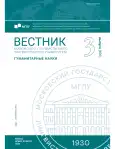Multicultural British Prose: Elif Shafak’s Novel Island of Missing Trees”
- Authors: Yuzmukhametova L.N.1
-
Affiliations:
- Kazan Federal University
- Issue: No 3(897) (2025)
- Pages: 129-135
- Section: Literary criticism
- URL: https://journal-vniispk.ru/2542-2197/article/view/286511
- ID: 286511
Cite item
Abstract
This article examines current trends in contemporary British multicultural novel. The topic is revealed on the example of the work of the famous British-Turkish writer, feminist, human rights activist and active civic figure Elif Shafak. The purpose of this study is to study the thematic diversity and problems of text, as well as their relationship with such phenomena as memory, memory, posttraumatic growth. The author uses cultural-historical, psychoanalytic, structuralist methods. The relevance of the work is determined by the study of the work of the multicultural writer - Elif Shafak precisely in the context of British literature and with the focus of the contribution of this author to the history of the contemporary British novel.
About the authors
Landysh Nurgayanovna Yuzmukhametova
Kazan Federal University
Author for correspondence.
Email: land_yz@mail.ru
PhD in Philology, Associate Professor, Department of Foreign Languages, Institute of International Relationship, History and Oriental Studies
Russian FederationReferences
- Tolkachev, S. P. (2004). Multikuturnyi context sovremennogo angliiskogo romana = Multicultural context of contemporary English novel: PhD in Philology. Moscow. (In Russ.)
- Sidorova, O. G. (2005). Britanskij postkolonial’nyj roman poslednej treti XX veka v kontekste literatury Velikobritanii = British postcolonial literature of the last third of the XX century in the context of literature of Great Britain: PhD in Philology. Moscow. (In Russ.)
- Alibhai-Brown, Y. (2001). Mixed feelings: the complex lives of mixed race Britons. L.: Women’s Press.
- Modood, T. (2007). Multiculturalism: A Civic Idea. Cambridge: Polity Press.
- Saad, C. S. (2017). Implicit bias: Do Hidden Attitudes Predict Our Behavior? Westmont Magazine.
- Repenkova, M. M. (2014). Simulyaciya sem’i v romane Elif SHafak «Iskender = Family simulation in the novel “Iskander” by E. Shafak. Aktual’niyi voprosy tuyrkologicheskikh issledovanii: The digest of articles dedicated to the 75-year of V. G. Guzeev (pp. 193–202). St. Petersburg: RHGA SPb. (In Russ.)
- Sofronova, L. V. (2011). Mass literature as a product of globalization: reflextions about genre diversity of contemporary Turkish prose. The RUDN Journal of Studies in Literature and Journalism, 2, 51–58. (In Russ.)
- Chaudhary, F., Munawar, A. (2023). Un-burying the Buried: Exploring Silence and Generational Trauma in Elif Shafak’s The Island of Missing Trees. Pakistan Journal of Social Sciences (PJSS), 43(2), 203–215.
- Iqbal, M., Imran, M., Babar, H. (2023). Biculturalism Leading to Third Space Identity: A Postcolonial Analysis of Elif Shafak’s The Island of Missing Trees. Al-Qamar, 6(1), 73–82.
- Shnirel’man, V. A. (2021). Traumatic memory: approaches to studying and interpretation. Siberian historic researches, 2, 6–29. (In Russ.)
- Hirsch, M. (1999). Projected memory: Holocaust photographs in personal and public fantasy: Acts of Memory: Cultural Recall in the Present (pp. 3–23). Hanover: University Press of New England.
- Assmann, A. (2016). New dissatisfaction with memorial culture. Moscow: NLO.
- Tedeschi, R. G., Calhoun, L. G. (1996). The Posttraumatic Growth Inventory: Measuring the Positive Legacy of Trauma. Journal of Traumatic Stress, 9, 455–471.
- Hartman, H. (1995). Geoffrey. On Traumatic Knowledge and Literary Studies Source. New Literary History. The Johns Hopkins University Press, 26(3), 537–563.
- Tedeschi, R. G., Park, C. L., & Calhoun, L. G. (1998). Posttraumatic growth: Conceptual issues: Posttraumatic growth (pp. 9–30). New-York: Routledge.
- Tedeschi, R. G., Calhoun, L. G. (2004). Posttraumatic growth: conceptual foundations and empirical evidence. Psychological Inquiry, 15(1), 1–18.
- Shamsutdinova, N. Z. (2007). Feministic motives in Angela Carter’s fairytales. Almanakh sovremennoy nauki I obrazovaniya (pp. 244–246). Tambov: Gramota.
Supplementary files










